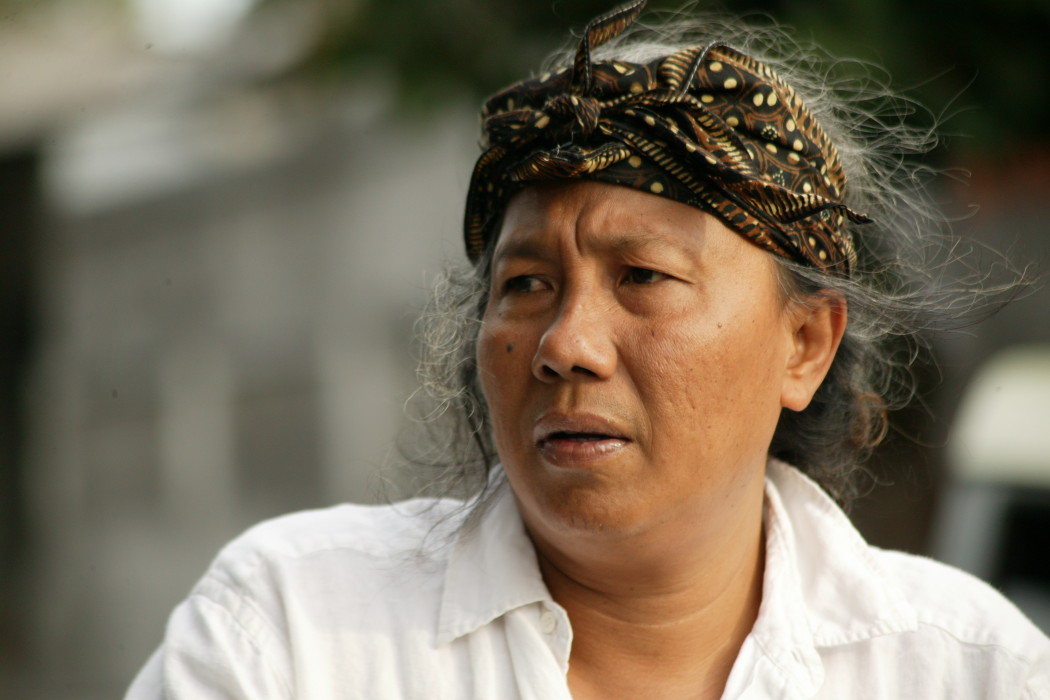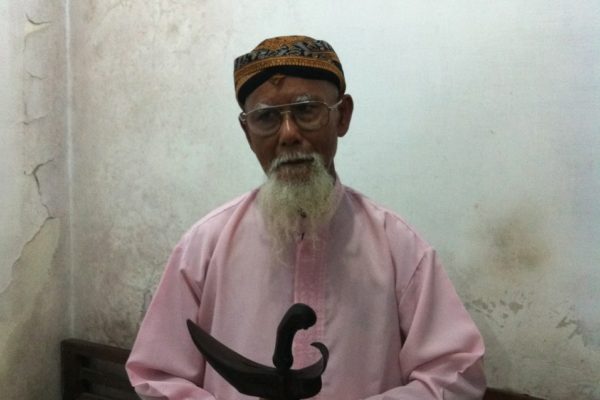“Daddy, you cannot die now, because now I have finally become successful, I can buy a car, I can build a house, I can finally prove myself to everyone who has been slandering and humiliating our family all this time. You should be able to enjoy all of this. How could life always be this unfair? When we were children, you were arrested and jailed for many years. Our mother was abandoned with us kids just like that, without a head of the family. None of our neighbors dared get close to us. It was only Pakde Sastro who cared for us by bringing us rice every month so that we could eat, and even that he had to do in secret. How we suffered! And now that we are all grown up and successful, you will be taken away again. Don’t go, Dad, don’t, don’t, don’t!”
My bulik, my father’s cousin, wailed with a distressed voice in front of the ICU. She was mourning her elderly father (my father’s uncle), who was in a coma and being treated after having a stroke, but her cries seemed more like screams of bitterness that had been piling up in a corner of her heart for decades, buried under layers of passing time. She was usually quiet, with a closed personality, but in front of the angel of death who was about to take her father, she protested loudly and vehemently.
That moment outside the ICU many years ago suddenly revealed something that frightened me, something that I had never fully realized. The effects of the tragedy of 1965 are incredibly profound for millions of people, for every single victim and their families, and those people are not random strangers in the middle of nowhere, it turns out they have names and faces and some of them are even the people closest to me, members of my own extended family! An untold reality, frozen in silence.
That incident in the hospital, which happened years ago, came back to me as I watched the documentary film 40 Years of Silence on this rainy and gloomy morning. Like a flood I couldn’t hold back, my tears flowed swiftly as I watched and learned about young Budi’s bitter and wounded soul, Bu Sumini’s gentle heart, Lanny’s brilliant mind, Degung’s exuberant spirit, Kereta’s well-mannered character, all of whom represent the millions of direct and indirect victims of a tragedy that has never been fully understood by my nation or by myself. I felt like this film, based on the many years of research conducted by the director Rob Lemelson, opened a cluster of wounds that had never be truly dried and healed, but rather had remained rotting and wet, closed up tight without the proper treatment. Yes, even I who was only watching and listening, found it unbearably painful to hear a bright daughter like Lanny say, “My father was like a hero to me, but this image collapsed when I saw him run away and leave us, his children and his family, just like that, when the rioting crowd was throwing stones and axes at our house”; to hear a strong son like Degung say, “I hated my mother, after she left me because she was put in prison and then married one of guards, and for that was called a prostitute.” I felt a hot and exhausting hate when I heard Budi say, “My future is complicated. I want to find some gasoline and burn down the houses of the people who persecuted us.” Also when I heard Bu Sumini, Budi’s mother whisper softly, “My father was sent to Nusa Kambangan because he was thought to be PKI. While he was gone, I was married off to an ex-prisoner who was allegedly PKI. In this village I feel alone because we are poor, we are stamped PKI, we have different religious beliefs. The people threatened to burn our house down, and although they finally did destroy it they didn’t really burn it down.” Stigma was revealed to be ignorant yet crippling when Kris, Budi’s older brother, told the story, “When my neighbor was looking for his chicken that he said was missing, he accused me of stealing that chicken just because I was the child of a PKI. But he had sold that chicken himself,” similar to what had happened to Alex, Lanny’s father, stamped as PKI and thought of as bad just because he was Chinese, and intelligent. Or when Pak Kereta was threatened that if he didn’t follow the orders to kill his friends who were stamped PKI, he would be killed in their place.
I first learned about the research initiative and making of this documentary 40 Years of Silence from a friend of mine, an anthropologist from Canada, 3 years ago. Her essential question, how ordinary people like me understood the events of G30S, struck me. I gathered the incomplete and convoluted fragments of information that I had. Up until now my father only told me about it in bits and pieces. Father decided to request early retirement from Indonesian Navy after feeling that his career had come to an end. One or two of Dad’s uncles had been held on Buru Island, accused of being PKI. In their youth they had been bright young teachers who were well read and were active organizers. Four or five of my coworkers who are much older than I, some retired and some already deceased, also experienced the brutal exile to Buru Island prison. Some of them were indeed party sympathizers but others were just unfortunate bystanders, adolescents standing at the side of the road witnessing the massacre and then captured and taken to prison along with those involved. According to my mother, after witnessing the mass slaughter in his village one of my grandparents went mute and never spoke again up until his death many years later. Perhaps his shock and trauma was prolonged because his house was right next to the place where they imprisoned and tortured those being held as alleged PKI.
According to my in-laws, a number of their family members and neighbors were party sympathizers and were arrested without it ever being truly proven whether they were legitimate targets to be chased and hounded as a part of the G-30-S drama. One of their older brothers ran away onto the jungle after such an accusation, and they aren’t sure where is now, left with only his name. What is most horrifying out of all of this is the simple question that my friend the anthropologist asked, “Out of all of these incidents, wasn’t there anyone from the victims’ families or their villages who was ever troubled enough to ask about this, say that this wasn’t right, who tried to straighten out history?”
Yes, this is a silence that has lasted too long, with hazy facts. It is estimated that one million people have been killed since the year 1965. They were casualities of the events of the coup d’état and a dominant power that acted out a heroic drama framed as the rescue of the nation. The black sheep were the members of the Indonesian Communist Party (Partai Komunis Indonesia, or PKI), who became easy targets in this drama. The result is that untold millions born into the following generation live lives of suffering, hatred, anger, and bitterness—like my aunt, like my grandpa, like Budi, Kris, Sumini, Mudakir, Lanny, Edy, Degung, Kereta, and a row of countless other names and faces.
I don’t want to pass down a vague or shrouded Indonesian history to my children. They have to know about this dark stain, because acknowledging the mistakes of the past can help build a strong life in the future. Tonight I ask my children, Matahari Bunga Indonesia (Sunflower of Indonesia, called Nesia), Bening Air Indonesia (the Clear Water of Indonesia, called Bening) and Tanah Cinta Indonesia (Indonesia, Land of Love, called Cincin) to sit and watch the film 40 Years of Silence and try to understand it. Tonight it won’t be me reading them their bedtime story; instead I will let Lemelson and his film do the talking.
“I want a different Indonesia, child. Not an Indonesia that covers up a history of violence, but an Indonesia that opens up and in doing so stops a culture of violence. Not an Indonesia that is allergic to or manipulates differences in political views, religious beliefs, ethnicity, or class, but an Indonesia that joyfully welcomes and wisely celebrates difference as a resource and a source of abundant wealth for future development. Not an Indonesia that is greedy for power and money, makes the practice of corruption commonplace, and scrapes away the last bit of nature until it is exhausted and destroyed, thinking only of the present, but an Indonesia that gives thanks and works hard to live prosperously and harmoniously with the entire nation forever. That is why Mother often forces you to only to follow Kompas TV programs, to read the Kompas daily, and is happy to write for Kompasiana. They are the ones that have a clear concept of what it means to be Indonesian: to celebrate difference and inspire.”
Yes, I want a different Indonesia for my children and Indonesia’s young generation, a better Indonesia.
Translated by Annie Tucker




